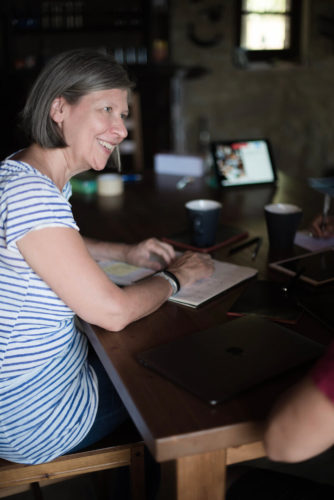Intuitiveness in coaching
In this post I reflect with you on how intuitiveness is important in the coaching process.
I practice Linguistic Empathy and I expect you to do the same. Please bear with me if my English is not perfect. Read the Italian version here.
I have been thinking about intuitiveness a lot, lately. The more I coach, the more I realize that in the palette of tools I resort to during my sessions, intuitiveness is the one I increasingly use with my clients. That is, I trust my intuitiveness in coaching more and more.
When I started coaching, seven years ago, I was very much concentrated on listening – both words and tone, peaks of enthusiasm, and all the things we coaches are so trained to pay attention to. We all know, however, that the key to effectively assisting our clients does not only reside in what they communicate verbally, but should be also sought in the non-verbal area.
Coaching online, however, makes it difficult to be permeable to the world of what is not said – if you use a webcam you access facial expression and partly the posture of the client, but if the video quality is not the best, you might still lose many important signals. Not to mention when the webcam can’t be turned on. That’s where intuitiveness comes in with an even stronger role. I have realized that unleashing my intuitiveness in coaching always brings good results – by good results I mean the clients’ satisfaction and their willingness to move on to action.
 It happened to me before becoming a coach, and it happens now: I anticipate people’s answers, I have this gut feeling about the way they feel and often even about the situation they are about to disclose. How many times has it happened to me that someone just told me “Something big’s going on, I’ll tell you about it”, and I already knew that it was about the partner’s infidelity, or a problem at work. How on earth do I sense this?
It happened to me before becoming a coach, and it happens now: I anticipate people’s answers, I have this gut feeling about the way they feel and often even about the situation they are about to disclose. How many times has it happened to me that someone just told me “Something big’s going on, I’ll tell you about it”, and I already knew that it was about the partner’s infidelity, or a problem at work. How on earth do I sense this?
I used to answer that I didn’t know, but now I do. Intuitiveness comes from spontaneously putting together a combination of non-verbal signals and the context in which they occur. And I realized that the capacity to read both of them (signals and context) comes from my experience. I have been exposed to so many situations and facts, and I have been in contact with so many people of different cultures and horizons, that I acquired a sort of “human database” in which I now spontaneously find an explanation to what I hear or feel a client is transmitting. It has got nothing to do with extra-sensory skills, as many want to make you believe. It is just a rich and fulfilling life in contact with others that has shaped my experience and gives me today the chance to “feel” beyond words and gestures.
So, allow me to infer that whereas coaching is a technique that everybody is supposed to be able to learn and practice, and that the process is helped by some natural personal talents, the experience each coach is exposed to in his/her life plays a very important role in becoming a good professional – it deepens your sense of empathy, widens the boarders of your understanding and makes you stronger in delivering effective feedback.

